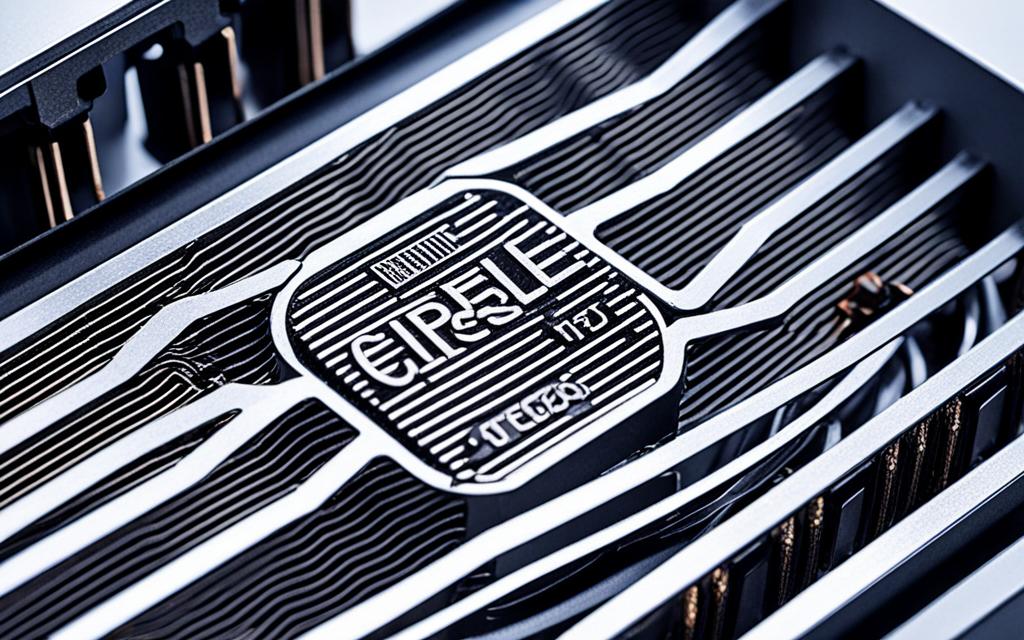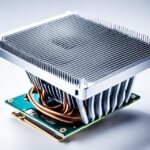Table of Contents
It is vital to know the details of your CPU cooler for peak system function and smooth upgrades. This knowledge prevents overheating by keeping temperatures in check. Overheating can harm your computer’s performance and shorten its life. With many CPU coolers out there, identifying yours is key for easy maintenance and updates. In this section, we delve into how to figure out which CPU cooler you have. We aim to give you the tools to maintain a flawless system operation.
Key Takeaways
- Identifying your CPU cooler model ensures optimal performance and compatibility.
- Visually inspecting your hardware can provide valuable insights into your CPU cooler type.
- Understanding different CPU cooler types can assist in making informed upgrade decisions.
- Checking manufacturer specifications aids in confirming compatibility and performance.
- Engaging with online tech communities can offer support and guidance for CPU cooler identification.
- Utilising online tools can simplify the process of CPU cooler identification.
- Thermal Design Power (TDP) is a critical factor to consider when selecting a CPU cooler model.
Why Knowing Your CPU Cooler Matters
Understanding your CPU cooler’s importance goes beyond just installing it. It’s key to keeping your hardware running well. Good cooling systems let the CPU deal with tough tasks without losing efficiency. With better cooling, the CPU reaches its top performance, boosting cooler effectiveness.
The Importance of Cooling for Your CPU
Many pre-built PC makers don’t tell you the exact CPU cooler they use1. They might say if it’s air or liquid cooling, but that’s it. This makes it hard to fix or upgrade. Also, 86% of people find checking the CPU socket helps figure out if a new cooler will fit2.
This shows how crucial it is to know about your cooler. It helps your CPU last longer.
Effects of Overheating on Performance
Overheating is bad news, especially when your CPU is working hard3. If temperatures climb, it means the cooler isn’t working right. This can cause your computer to shut down or restart suddenly to prevent damage3.
Looking at your cooler can show issues. For example, broken fan blades or dust buildup3. These problems should be fixed quickly to keep things running smoothly.
Common Types of CPU Coolers
When you think about cooling your CPU, it’s key to know the different CPU coolers out there. Each kind offers unique benefits that affect performance and experience.
Air Coolers
Air coolers are a top pick for many. They’re cost-effective and work well. Prices start at about $25, offering great value. Even the pricier models, up to $100, still prove efficient. Brands like Noctua and Cooler Master stand out with their designs.
It’s important to check compatibility. Most air coolers fit a variety of Intel and AMD sockets4.
Liquid Coolers
Liquid coolers are great for high-performance tasks. They start at $60 and can go above $150. The price depends on the brand and features. For the very best in cooling, a custom set-up is your go-to. Though more expensive, they offer unmatched cooling for serious gaming4.
Passive Coolers
Passive coolers work in silence, using natural airflow. They’re perfect if you want a quiet setup. However, they’re not the best for heavy loads. The case needs good airflow to help them work right. They suit low-power or silent computers well.
| Type of Cooler | Price Range | Cooling Efficiency | Noise Level | Best For |
|---|---|---|---|---|
| Air Coolers | $25 – $100 | High | Moderate | General use and gaming |
| Liquid Coolers | $60 – $150+ | Very High | Low to Moderate | High-performance tasks |
| Passive Coolers | $20 – $80 | Low to Moderate | Very Low | Low-power or silent builds |
Knowing the types of CPU coolers helps you make the best choice for your needs and budget. This information is crucial for boosting your CPU’s performance and lifespan5.
How to Check What CPU Cooler I Have
Finding out which CPU cooler you have can seem tough, but it’s crucial for your PC’s health. You can check your cooler’s specs by looking at it, reading the manufacturer’s info, or checking the product manual.
Visual Inspection of the Cooler
Looking at your cooler directly is the easiest way. Open up your PC and take a good look at the CPU cooler. Search for any logos or model numbers on it or its fans. This helps figure out the cooler’s type and what it can do.
Using Manufacturer Specifications
If you can’t find any marks, check the manufacturer’s specs. Brands like HP or MSI have details about their cooling systems. This site1 is great for more info. It’s super useful, especially for PCs that came already built.
Checking the Product Manual
The product manual is another place to look for cooler info. They usually have key facts about the cooling system used. But, they might not have every detail, especially for OEM products. This means finding out about your cooler could be harder.
Inspecting Your Cooler Physically
Checking your CPU cooler is vital for your PC’s health. Knowing how to open your PC safely is key. It helps protect your system and teaches you about your cooler.
Steps to Open Your PC Gibboun Safely
Make sure the computer is off and unplugged before you start. This keeps you and your PC safe. Follow these steps:
- Get the tools you might need, like a screwdriver.
- Take off the screws or clips holding the side panel.
- Open the side panel to see inside your PC.
What to Look For on the Cooler
Once inside, find the CPU cooler on the motherboard. It’s usually easy to spot by its fan or heatsink. Check for:
- Brand labels to help identify the cooler.
- Printed model numbers for further information online.
- Unique features that show if it’s an air or liquid cooler.
Inspecting your CPU cooler often is key to a long-lasting PC6. Clean it regularly to avoid dust, which improves cooling6. If your PC gets too hot, think about updating your cooler7. Use programs like SpeedFan or HWMonitor to keep an eye on temperatures8. Staying on top of cooler checks means better performance, especially when you’re pushing your PC hard.
| Cooler Type | Features | Maintenance Tips |
|---|---|---|
| Air Cooler | Uses a fan and heatsink to cool down the PC. | Clean often to keep the air flowing well. |
| Liquid Cooler | Takes in heat with liquid and cools through radiators. | Look for leaks and check the pump is working fine. |
| Passive Cooler | Depends on heatsinks alone, no fans. | Make sure your case is airy and check for dust often. |
Creating a regular schedule for cooler checks improves your PC’s performance678. This way, everything runs smoothly and effectively.
Online Resources for Identification
Finding out what model your CPU cooler is can be made easier online. A great place to start is the manufacturer website. Here, you can find lots of details and lists of parts. If you search for your cooler model, you can discover what features it has and if it fits with your system. Sometimes, going directly to these sites might not work. Then, looking through CPU cooler online resources can offer the help you need.
Using Manufacturer’s Website
Starting at the manufacturer website is a solid first move to figure out your CPU cooler’s model. There, you can usually come across a lot of guides and articles. These can help you understand the different models available. Manufacturers often keep records of their products. This makes it easier for you to match your hardware with the right documents online. Finding manuals or specs is key to learning about your cooler’s features and how well it works.
Engaging with Online Tech Communities
Joining online tech groups on places like Reddit or tech forums can be super helpful. These communities love helping out, especially with PC building and fixing. Whether on Reddit or the Linus Tech Tips Forum, people are ready to help. If you post pictures and details of your cooler, you’ll probably get quick advice from experts who know lots about different hardware. Using these forums can make finding out about your cooler much faster. Plus, you might learn some tricks to make it work better. These groups show how working together can make a big difference in the tech world.
| Resource Type | Description | Link/Platform |
|---|---|---|
| Manufacturer Website | Official support and specifications for identifying models | Various |
| Tech Forums | Community-driven advice and troubleshooting assistance | Reddit, Linus Tech Tips |
| Image Recognition Tools | Visual identification of hardware via upload | Google Image Search, Google Lens |
Using these different CPU cooler online resources helps you deal with the complex world of computers. It makes sure you can make the most of your system and fix problems effectively91011.
Compatibility Factors to Consider
It’s vital to know about compatibility when choosing a CPU cooler. You must ensure it fits well to manage heat and run your system smoothly.
Socket Compatibility of CPU Coolers
Choosing the right CPU cooler largely depends on the socket types. Intel’s LGA sockets (like LGA 115x, 1700, and 1200) and AMD’s AM4 and AM5 are commonly used12. Manufacturers list which sockets their coolers fit12. Some coolers include different brackets for various sockets. Most current motherboards manage the cooler fans with both PWM and voltage control12.
Fan headers are located near the CPU socket or along the motherboard’s edges12. Always check the product details and manuals for compatibility12.
Understanding Thermal Design Power (TDP)
The thermal design power (TDP) is crucial for choosing a compatible CPU cooler. CPUs with higher power come with stronger coolers13. You can sometimes use the same cooler for different CPUs if they fit the same socket or slot. Aftermarket coolers are more flexible, working across different generations and brands13.
Cooler makers might also offer kits to fit older coolers to new CPUs13. The size and design of coolers vary. Make sure they fit in your computer case13. For air coolers, match the cooler’s height with your case’s width. Water coolers need room for radiators and fans, available in sizes like 120mm, 240mm, or 360mm13.
Conclusion
Knowing about your CPU cooler is key for keeping your computer running well. It’s not just about knowing parts but also about making smart choices for upgrades. Many people don’t know which cooler their computer uses. This shows a gap in technical understanding14.
Now, finding out about your cooler is easier. You can look at it, use special software, or talk to people on sites like Reddit’s r/buildapc and Tom’s Hardware14. Whether you need a simple air cooler like the Hyper 212 EVO or something fancy like the Corsair H150i Elite Capellix, there’s something for everyone. It’s also important to know the thermal design power (TDP) your CPU needs. This makes sure your cooler works well with your CPU15.
To sum up, getting to know your CPU cooler is vital for your computer’s well-being. By exploring your options and using helpful resources, you can improve your computer’s performance. This keeps your computer in top shape for a long time.
FAQ
Why is it important to know my CPU cooler model?
Knowing your CPU cooler model keeps your system running well and ready for upgrades. It stops overheating to make your CPU work better and last longer.
What are the main types of CPU coolers available?
CPU coolers come in three types. Air coolers use fans and heatsinks to remove heat. Liquid coolers cool better with liquid. Passive coolers don’t use fans, which makes them silent.
How can I identify my CPU cooler through visual inspection?
Open your computer and look at the cooler for brand logos or numbers. Check for unique features that can help you identify it.
What should I do if I cannot find markings on my cooler?
If there’s no clear marking, look on the maker’s website, especially for pre-built PCs. You can also check the product manual for details.
What precautions should I take when inspecting my CPU cooler physically?
Always shut down and unplug your PC before opening it. Take off the side panel gently. Be careful with components to avoid static harm.
Where can I find additional information about my CPU cooler online?
Start with the manufacturer’s website for specs. Online forums like Reddit and XDA are good too. You’ll find tips from people with the same hardware.
How do I determine the compatibility of my CPU cooler?
Check your motherboard’s CPU socket type to match the cooler. Knowing the Thermal Design Power (TDP) of your CPU and cooler is key for a stable system.
What is Thermal Design Power (TDP) and why is it important?
TDP tells you how much heat a cooler can deal with. Matching the TDP of your CPU and cooler stops overheating. This keeps your system working its best.
Source Links
- https://www.xda-developers.com/how-find-cpu-cooler/ – How to find out what CPU cooler you have
- https://www.overclockers.co.uk/blog/how-to-check-cpu-cooler-compatibility/ – How to check CPU cooler compatibility
- https://www.jawa.gg/blog/how-to-check-cpu-cooler/ – How to Check a CPU Cooler
- https://www.tomshardware.com/reviews/cooling-buying-guide,6105.html – How to Buy the Right CPU Cooler: A Guide for 2021
- https://www.corsair.com/us/en/explorer/diy-builder/how-tos/how-to-find-out-which-cpu-you-have/ – What CPU do you have in your PC?
- https://softwareg.com.au/blogs/computer-hardware/how-to-check-cpu-cooler – How To Check CPU Cooler
- https://forums.flightsimulator.com/t/do-i-need-a-better-cpu-cooler-need-help-interpreting-stress-test-results/492956 – Do I need a better CPU cooler? Need help interpreting stress test results
- https://ms.codes/blogs/computer-hardware/how-to-know-if-my-cpu-cooler-is-working – How To Know If My CPU Cooler Is Working
- https://pccaselab.com/how-to-find-pc-case-model – How To Find PC Case Model – 5 Ways To Identify
- https://documentation.suse.com/smart/systemtuning-performance/html/cpu-check-temperature/index.html – Check and monitor CPU temperature
- https://www.amd.com/en/resources/support-articles/faqs/CPU-7.html – How to Install or Remove an AMD CPU Cooler
- https://www.corsair.com/us/en/explorer/diy-builder/cpu-coolers/aio-liquid-cpu-cooler-compatibility-with-cpus-and-motherboards/ – Which AIO Coolers are compatible with which CPUs and motherboards
- https://www.howtogeek.com/are-cpu-coolers-universal/ – Are CPU Coolers Universal?
- https://ms.codes/blogs/computer-hardware/how-to-check-what-cpu-cooler-i-have – How To Check What CPU Cooler I Have
- https://ms.codes/en-ca/blogs/computer-hardware/how-to-choose-a-cpu-cooler – How To Choose A CPU Cooler








